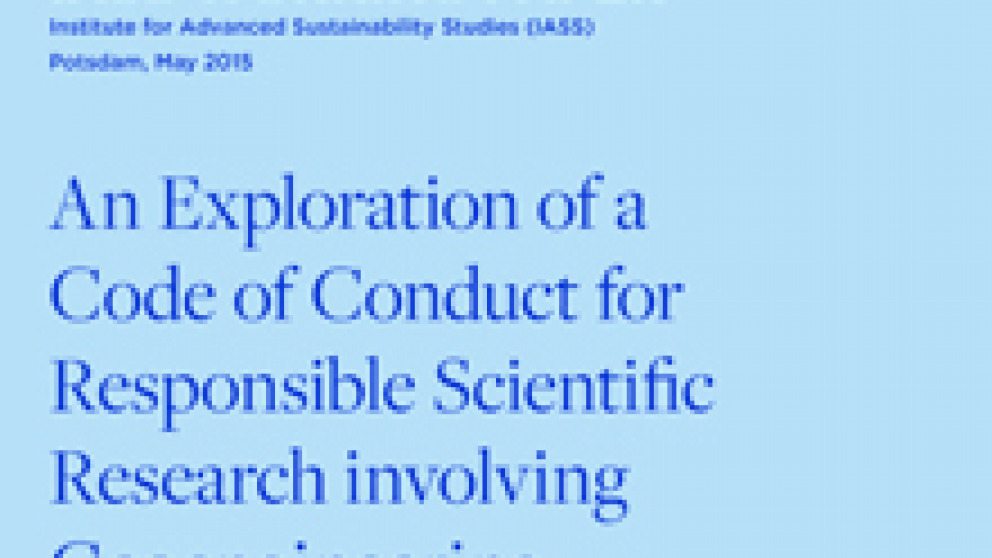Headline:
New IASS Publication Explores an International Code of Conduct for Climate Engineering Research

Important progress is being made in international climate talks and at the national and sub-national levels towards addressing the causes and consequences of climate change. Nonetheless, some scientists have suggested that more action may be required to curb rising temperatures in this century and have begun to discuss intentional large-scale interventions in the planetary environment as an additional response strategy. But even theoretical work on climate engineering can be controversial and field experiments have the potential to cause environmental harm. This has led to widespread calls for the development of governance and regulatory frameworks for climate engineering.
A new study by IASS legal researchers Anna-Maria Hubert and David Reichwein provides a comprehensive examination of a possible international code of conduct for climate engineering research. The IASS Working Paper entitled ‘An Exploration of a Code of Conduct for Responsible Scientific Research Involving Geoengineering’ is being released in collaboration with University of Oxford’s Institute for Science, Innovation and Society (InSIS).
The novelty of the IASS Working Paper lies in its provision of draft guidelines, together with commentaries, that could support the development of a code of conduct for climate engineering research. This tangible step forward is buttressed by an extensive survey of the existing international legal landscape that builds upon a growing body of research on this topic. It discusses salient legal concepts, principles and procedural mechanisms relevant to climate engineering, focusing on the near-term prospect of scientific research conducted in the open environment. This preliminary legal study also integrates the perspectives of other academics representing the natural and social sciences, as well as stakeholders from government agencies and civil society organisations.
One of the points discussed in the draft guidelines is how the public should participate in climate engineering decision-making. While the techniques subsumed under the umbrella terms ‘geoengineering’ or ‘climate engineering’ – from the injection of particles into the stratosphere to ocean fertilisation – are extremely complex, Draft Article 15 emphasises that the discussion of these approaches should not be confined to the scientific community. It thus calls for public participation and consultation at different stages of the research process, including possible field experiments in this area. The commentaries to this draft article summarise the status and content of the principle of public participation and also point to the inherent challenges in its application to research involving climate engineering. What can be done to ensure that participatory structures, once established, are effective? Who exactly should be consulted? The people directly affected by a proposed experiment or the wider public? And how can ordinary citizens participate in a discussion of the technicalities of geoengineering that they may not fully understand?
IASS Scientific Director Mark Lawrence considers this Working Paper a major and well-balanced advance in the discussions around climate engineering: “Climate engineering, as a highly controversial topic, needs effective governance for both research and any possible future implementation, if these are to be carried out in a way that assesses environmental impact and is respectful of the rights of the vast populations that would be affected by any of the range of techniques that are being discussed. This study of a code of conduct provides us with valuable insights into how to go about developing effective governance for research activities related to climate engineering.” Lawrence stressed that research into what effective governance and regulation might entail is neither about encouraging or paving the way towards future implementation of any particular techniques, nor setting up a moratorium against research, which could leave decision-makers with having to make critical decisions without adequate information about the range of effects, side effects, uncertainties and risks involved in the different proposed climate engineering techniques.
The idea for a code of conduct stretches back to the influential 2009 Royal Society report on Geoengineering the Climate, which noted the desirability of an “internationally agreed (but initially voluntary) code of conduct and system for approval for geoengineering research”. Since then, important milestones have been achieved in the development of governance and regulatory frameworks for climate engineering. In 2009, academics at the University of Oxford proposed five high-level principles for climate engineering governance – the ‘Oxford Principles’ – which were later endorsed by the UK House of Commons Select Committee on Science and Technology. Internationally, the Convention on Biological Diversity has adopted a series of non-binding decisions on climate engineering. And most significantly, countries party to the London Protocol, an international treaty regulating the dumping of waste and other matter at sea, agreed in 2013 to an amendment for regulating ocean fertilisation and possibly other marine geoengineering activities in the future.
Despite the important progress being made, there remain gaps in existing governance and regulatory frameworks, especially relating to atmosphere-targeted climate engineering proposals, such as stratospheric aerosol injection. There is also a need to consider harmonisation across sectors, regimes and at national, regional and international levels.
Anna-Maria Hubert, the Working Paper’s lead author, explained that “climate engineering does not exist in a legal void. Even where the law does not apply directly, it is important to remember that the issue is situated within a large body of evolving international norms that clearly bear upon the design of an appropriate governance architecture for climate engineering research.” She also stressed that the draft code of conduct does not claim to be the final word on climate engineering but is intended to stimulate further governance research, critical discussion and new processes.
Link:
21.05.2015

